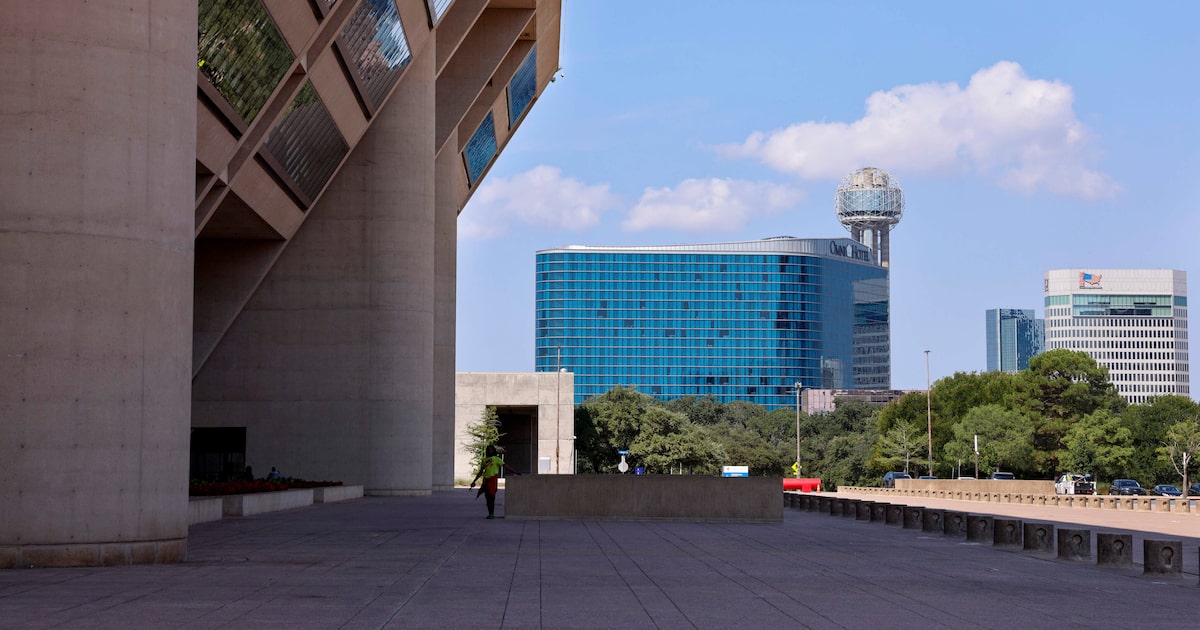For the 10th straight year, the Dallas City Council is considering lowering the property tax rate — even though many homeowners will still pay more due to rising home values and costs.
However, the exact new rate is still under discussion, as city officials continue to review a proposed $5.2 billion budget and gather public input before a final vote in mid-September. Council members suggested Wednesday that there may be some changes to the city manager’s proposed rate.
Currently, the tax rate is 70.47 cents per $100 valuation, and City Manager Kim Tolbert’s proposed budget for the coming year lowers the rate to 69.97 cents.
However, the City Council voted 10-5 on Wednesday to set a maximum possible rate at 70.22 cents — still less than this year’s rate but more than Tolbert’s proposal. Council members said the move would give them wiggle room as they discuss the budget with their constituents.
Political Points
Council members Chad West, Zarin Gracey, Jaime Resendez, Laura Cadena, Adam Bazaldua, Lorie Blair, Paula Blackmon, Kathy Stewart, Bill Roth, and Deputy Mayor Pro Tem Gay Donnell Willis voted in favor of the motion. Mayor Eric Johnson, Mayor Pro Tem Jesse Moreno and council members Maxie Johnson, Cara Mendelsohn and Paul Ridley voted against it.
Under Tolbert’s proposed rate, a home valued at $382,010 — with a $175,000 homestead exemption — is projected to lower the average homeowner’s tax bill by about $12.66 next year. But tax bills could still rise or fall depending on changes in home values.
Tolbert’s proposed budget plan calls for a significant increase in funding for police and fire services amid cuts to city jobs, community pools, libraries, and other consolidations.
Council member Adam Bazaldua, who proposed the higher ceiling, argued that setting a lower bar could limit the council’s ability to explore alternatives to some of the proposed cuts. If the council approves Tolbert’s rate, the city would collect $11 million less in property taxes. If they stick with the proposed 70.22-cent ceiling, the loss would be about $5.5 million.
“I believe it would be preliminary for us to set a ceiling before having a discussion to see if there are potential viable options to save some of the cuts that were brought forth with this proposed budget,” Bazaldua said.
The City Council scheduled a Sept. 17 public hearing at City Hall to gather residents’ opinions on the tax rate before voting to finalize it and the citywide budget the same day. The new rate and budget would take effect on Oct. 1.
Even though Dallas has lowered its property tax rate for nine consecutive years, many homeowners still face higher tax bills because of rising home values and costs offset the reductions. This comes as Texas lawmakers advanced a bill Monday to lower the cap on how much cities and counties can raise property tax revenue each year without voter approval, cutting it from 3.5% to 1%.
Setting a tax rate ceiling is a routine part of Dallas’ annual budget process and doesn’t guarantee the final rate won’t be lower. For example, in 2023, the council initially set a ceiling of 73.93 cents in August, but later approved a final rate of 73.57 cents in September.
But this year’s rate ceiling and Tolbert’s proposal both won’t be enough of a decrease for the average resident to feel it, argued council member Cara Mendelsohn. She proposed a property tax rate ceiling at 67.32 cents per $100 valuation, which she said would ensure the city collects the same amount of revenue from taxpayers as it did the previous year, even if property values rise.
“A ‘no new revenue rate’ means Dallas families will keep more of what they earn,” Mendelsohn said. “For the City Council, it means we hold the line, protect affordability and show taxpayers we value every dollar they send to City Hall.”
Dallas currently has the second-highest property tax rate among Texas’ 10 largest cities, trailing only El Paso, which has a rate of 76.14 cents per $100 of assessed value. Mendelsohn and Mayor Eric Johnson have advocated for similar tax rate reductions in recent years. In 2023, Johnson brought a toy boat to a council budget meeting and demonstrated how the city’s financial situation was like the Titanic approaching an iceberg.
Dallas Chief Financial Officer Jack Ireland warned that a 67.32-cent rate would force the city to cut an additional $30.5 million from the budget. This could mean hiring 50 fewer police officers, reducing planned pay raises for police and firefighters, and making cuts to the Dallas Zoo, Fair Park and upgrades to streets and city facilities. It could also speed up plans to close community pools and libraries, according to Ireland.
Mendelsohn’s proposal failed in a 13-2 vote, with only her and Johnson supporting it. Many council members, including Paul Ridley, opposed it due to the severe cuts it would require.
“Given the draconian nature and the impact of such budget cuts, I cannot support this amendment,” Ridley said.
Mendelsohn suggested the city could achieve the $30.5 million in savings by cutting unnecessary staffing and expenses rather than essential services. Another proposal from Mendelsohn to set the ceiling to Tolbert’s proposed rate also failed.
Ireland said he believed comparing Dallas’ tax rate to that of other Texas cities isn’t as straightforward, since some of those cities may have different revenue sources. Austin, for example, has a municipal government-owned electric utility, and San Antonio has a city-owned gas utility with revenue that is reinvested in the city’s budget.
Ultimately, Ireland emphasized that the final decision on the property tax rate and the necessary cuts to fund it would be made by the City Council.
“We will make our recommendation,” he said. “Y’all will then figure that out.”
